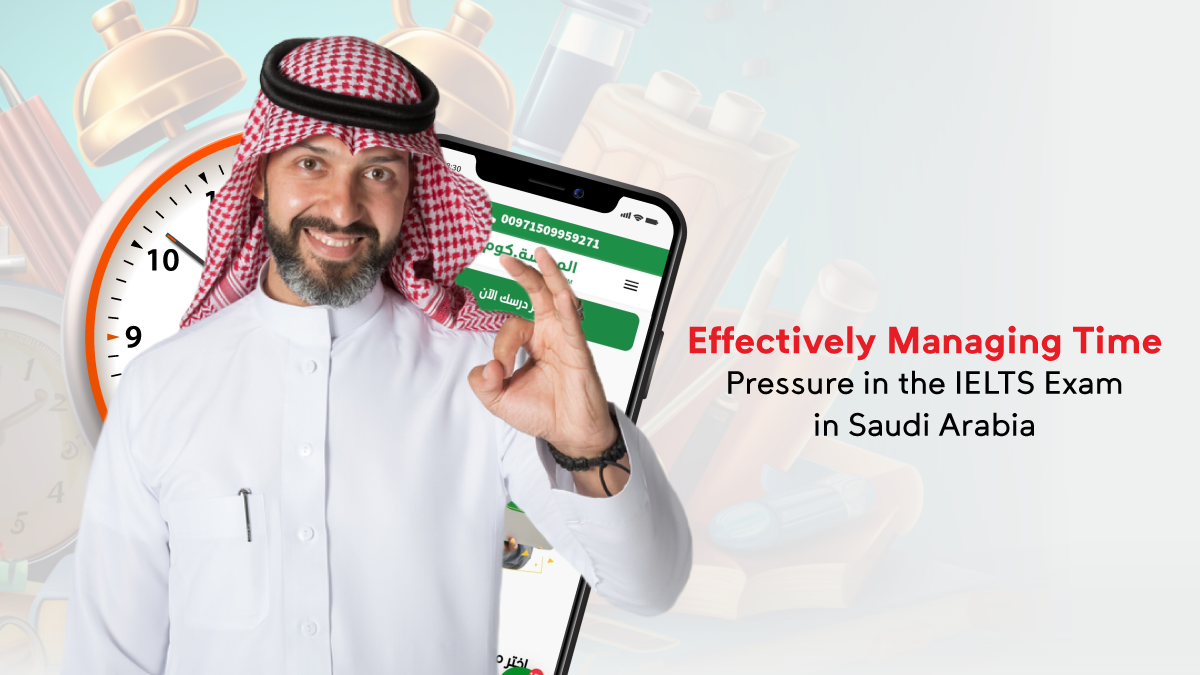
The time factor is considered one of the most important factors affecting the IELTS test. It is known that the IELTS test is not like other tests that aim to measure the language in traditional ways, such as answering the questions asked in the correct way.
In this article, we will talk about the time pressure in the IELTS exam and when preparing for it, and how it is possible to manage time pressure in the IELTS in the right way to ensure the best results in the IELTS exam.
How to manage Time pressure in the IELTS exam
Let us be frank from the beginning. We live in an age of speed. Everything has become available and fast. We have become ignorant of the importance of time, or more precisely, we do not feel it. Therefore, we overestimate our capabilities or what we can do in one day, and we see that we do not need to manage time. Or we don’t know its importance.
But let me tell you that time management is one of the most important skills that has begun to find great popularity, especially in the professional and even academic fields, but why is it so important, and why do many people seek to learn this skill?
First, what do we mean by time management?
Time management is simply the process of organizing and distributing the time we have available in an efficient and organized manner by dividing tasks to accomplish tasks and activities more efficiently and effectively. Time management is an important skill in our daily lives, whether at work or in our personal lives, as it helps us achieve goals, increase productivity, and reduce stress and pressure.
Learning time management will help you:
- Increase productivity: Managing time effectively helps us increase our productivity and effectiveness. When we prioritize, identify important tasks, and allocate time to accomplish them, we are better able to accomplish more in less time.
- Achieving goals: If you have specific goals in your life, time management helps you achieve them. By organizing and structuring your time well, you can devote the time needed to work on and progress toward achieving personal and professional goals.
- Reduce stress and pressure: When we manage our time effectively, we reduce stress and stress resulting from the accumulation of tasks and postponed tasks. By planning ahead, organizing our schedule, and completing tasks on time, we can relieve excess stress and improve our quality of life
- Improve focus and attention: Time management helps us improve focus and attention because we allocate specific periods of time to work on tasks. By avoiding distractions, turning off phone notifications, and organizing our work environment, we can maintain our focus on important tasks.
- Balancing work and personal life: Time management helps us achieve a balance between work and personal life. By making time for rest, relaxation, and social family activities, we can enjoy a balanced life and improve the quality of personal relationships.
- Avoid Stress and Overwork: Time management helps us avoid excessive stress and overwork. When we set priorities and organize our time well, we reduce the pressure of completing tasks on time and can control our workload.
Therefore, learning time management helps you manage time pressure in the IELTS and manage your life better, and these are some steps that will help you manage your time better:
- Prioritize: Identify the most important and priority tasks and complete them first. Set daily and weekly goals and try to focus on activities that will contribute to achieving those goals.
- Create a schedule: Create a schedule or calendar containing specific tasks and important appointments. Use your time effectively by allocating a limited amount of time to each task and regularly evaluating your progress.
- Time management: Organize your appointments and tasks well. Use techniques like the Pomodoro technique where you work for a set period of time such as 25 minutes and then take a short break before returning to work. This helps you stay focused and productive during work periods.
- Advance planning: Plan future tasks in advance and prepare the necessary tools and materials before starting work. This helps you save time and avoid stress when you start getting the job done.
- Avoid distraction: Try to avoid distraction and preoccupation with unimportant matters while working. Turn off mobile phone notifications and make sure your environment helps you focus and pay attention
- Learning to accept rejection: Time management may require that we learn to accept rejection graciously when others ask for our help with matters that conflict with our priorities. Set clear boundaries and be able to say no when necessary.
- Focus on achieving a balance between work or academic life and personal life: Try to maintain a healthy balance between work and personal life. Make time to rest, relax, and catch up with friends and family. This helps avoid stress and burnout and increases your personal satisfaction.
- Dividing large tasks into smaller tasks: We often procrastinate or procrastinate as a result of the difficulty of the task or that it is long and takes time. Here you will find that the solution is simply to divide the tasks into smaller, easier, and more manageable parts. You will find that it is these small tasks that contribute. In carrying out the big mission.
Consequences of neglecting time management:
Therefore, time plays a crucial role in our daily lives. Therefore, it is no longer a luxury to master this skill. On the contrary, it has become a foundation that must be learned.
One of the most important reasons that make us unable to complete tasks effectively is our inability to manage time, and one of the most important consequences of neglecting This skill:
- Wasting time: When we do not manage our time effectively, we may waste a lot of time on unproductive activities or low-value accomplishments. This can lead to delays in completing important tasks and a backlog of work.
- Increased tension and pressure: Not managing time well leads to increased stress and psychological pressure. You may find yourself in a state of stress and tension because you are trying to accomplish a lot of tasks in a short time.
- Negative impact on productivity: Not managing time properly negatively affects productivity. You may find it difficult to complete tasks on time or to the required standard, which affects the quality of the work you provide.
- Impact on personal relationships: Not managing time properly may affect personal relationships. If you spend too much time at work and neglect time for family and friends, this may affect your social and emotional connection.
- Missing opportunities: Not managing time properly may lead to missing important opportunities. If you don’t organize your time well, you may miss out on opportunities for personal and professional growth and development.
The skill of time management in the IELTS exam is considered an essential skill. The essence of the test depends on your ability to deal with the English language and know the correct answers within a specific time. Certainly, the questions are not easy at all, so do not expect it to be easy in any respect, one of the most important methods is to manage time pressure in the IELTS exam:
- Time Commitment: The IELTS test sets strict time limits for each section. Effective time management ensures that you can complete all tasks on time and avoid leaving any questions unanswered.
- Distribution of tasks: When you prioritize and distribute time accordingly, you can focus on each section of the test systematically. This ensures that you devote enough time and effort to each assignment, increasing your chances of getting a higher grade.
- Completing tasks: By managing your time well, you can avoid spending excessive time on one question or task, which can result in not having enough time for other tasks. Effective time management enables you to complete all required tasks and increase your chances of achieving a higher score.
- Review and Edit Answers: Time management also allows enough time to review and edit your answers before submitting the test. By taking the time to proofread and edit, you can correct your mistakes and improve the quality of your answers before submitting them.
The time in the IELTS exam can cause relative pressure on learners. There are several factors that contribute to the increased time pressure in the IELTS exam:
- Time constraints: The IELTS exam requires learners to complete many tasks in a limited time. Time constraints put pressure on learners to complete tasks on time and avoid leaving any questions unanswered.
- Time distribution: Learners must distribute time between the different sections of the exam appropriately. It may be difficult for some to determine the appropriate amount of time for each section and distribute it effectively, which causes anxiety and stress.
- Reading and writing speed: Reading and writing speed can be a factor influencing the time pressure of the IELTS exam. If you do not have the ability to read texts quickly or write answers quickly, you may find it difficult to complete tasks on time.
- Stress and anxiety: The limited time in the IELTS exam can cause increased stress and anxiety in learners. Time-related pressure can affect students’ performance and increase the level of stress and stress.
To deal with the time-related pressure of the IELTS exam, learners are advised to prepare and practice adequately before the test. Intense exercise and practicing time management can help reduce stress and increase confidence in the ability to complete tasks on time. It is also recommended to practice calming techniques and deep breathing to control stress and relax during the test.
Preparing for the IELTS exam with elmadrasah.com
Every success begins with a good plan, and this is the same case with the IELTS test. You cannot succeed in it and get the score you want without good preparation and knowledge of all aspects of the exam and how to deal with the various difficulties in the test. Therefore, to prepare for the IELTS test, you must do the following:
- Make a plan: Before you start preparing, make a specific time plan. Determine how long you plan to prepare and divide the time between the different sections of the test, such as reading, listening, writing, and speaking. Creating a plan helps you organize and organize your work and maintain sustainable progress.
- Use appropriate educational resources: Identify appropriate educational resources for the IELTS test and use them effectively to prepare. Check out approved study books, websites, and other educational materials that provide strategies and targeted exercises for each section of the test.
- Schedule training time: Schedule training time on a regular and consistent basis. Set specific time periods per week to prepare and practice, and try to stick to them as much as possible. You can distribute the preparation time according to your personal needs and capabilities.
- Divide time into short periods: It can be difficult to sit for long periods of time to prepare. Instead, cut time into short, focused chunks. For example, set aside 30 minutes in the morning and evening for intense preparation. Make sure you set realistic goals for each period and set a timer to determine how long you will work.
- Focus and diversification: Try to focus your efforts on different aspects of the test and not focus on just one area. Diversify the exercises and tasks you do to enhance your skills in all sections.
- Practice and Review: Take practice test exercises regularly to increase confidence and improve performance. Review answers and analyze errors to understand concepts related to the test and improve performance next time.
- Previous test samples: If you want to succeed in the IELTS test, you must first become familiar with the test system, and thus practice the various questions and tests. This will help you avoid the surprise factor in the test as much as possible.
- Ask for help: If you are having difficulty managing time or need additional guidance, do not hesitate to ask for help. You can consult an experienced IELTS teacher or join a training course to prepare for the test.
elmadrasah.com is considered the best choice for preparing for the IELTS test . It will help you learn the skill of managing time pressure in the IELTS, in addition to preparing for the IELTS test in Saudi Arabia and developing you in all the language skills and sections required in the test because it is characterized by:
- Interactive preparation courses
elmadrasah.com offers a variety of IELTS preparation courses . These courses are interactive, allowing students to learn at their own rate without pressure or tension.
Courses cover all sections of the IELTS test equally, including reading, writing, listening, and speaking. Each section is presented by qualified teachers who provide clear explanations and practical instructions.
- High-quality educational materials
elmadrasah.com also offers a wide range of high-quality educational materials that students can use to prepare for the Saudi IELTS test . These materials include:
- IELTS-approved books, worksheets, and practice tests
- Educational videos and audio lessons
- Interactive tools and applications
Students can access these materials through elmadrasah.com platform , which can be accessed from any device connected to the Internet.
- Individual support
elmadrasah.com also provides individual support to students. Students can reach out to their teachers for assistance with any questions or concerns they have.
This one-on-one support can be especially helpful for students who are having difficulty mastering a particular concept, need help improving their skills on a particular section of the test, or are simply stressed out and don’t know how to deal with it.
- Flexibility in choosing appointments
elmadrasah.com makes it easy for students to organize their appointments, by giving students the freedom to choose the dates that suit them, and since the courses are online , they can attend from the place that suits them, and they do not need to be physically present to attend their lessons.
- Work on the four sections
elmadrasah.com helps you train on the four sections of the IELTS test equally and in a way that suits the levels of different students, in addition to training tests, previous test models, and continuous evaluation of students’ skills and performance, which helps to work intensively on the points that need development.
- Innovative educational methods and methods
We at elmadrasah.com are keen to use the latest educational methods and various innovative methods that can help students understand better. No matter how different it is, we will find the method that suits you. It is also characterized by being interactive to add an element of fun and curiosity to the students.
Remember that when preparing for the IELTS test, it may be stressful and exhausting, but focus on the basic tips when preparing for the IELTS test in general:
- Intensive preparation: Do early and extensive preparation for the test. Study the required materials and practice test exercises on a regular basis. Good preparation boosts self-confidence and reduces stress.
- Practical practice: Practice IELTS practical tests regularly. This helps you get used to the test format, control your time, and estimate how long it will take to answer each question. Practice reduces anxiety and stress during the actual test.
- Breathing and Relaxation Techniques: Learn deep breathing and relaxation techniques before and during the test. Use deep breathing and focus on the present moment to manage stress and tension. You can also use relaxation techniques such as meditation or yoga to calm the mind and body.
- Sleep and proper nutrition: Maintain a healthy lifestyle and make sure to get enough sleep before the test. Good sleep enhances focus and attention and reduces stress. Also, make sure to eat a healthy meal before the test to contribute to good energy and focus.
- Positive thinking: Change your outlook on the test and consider it an opportunity to demonstrate your abilities and skills. Focus on the progress you have made in preparation and your ability to excel. Avoid negative thinking and doubts about your abilities. Positive thinking helps reduce stress and increase self-confidence.
- Focus on the current question: When taking the test, try to focus on the current question and not think about the previous questions or worry about the upcoming questions. Focusing on the present moment helps achieve better performance and avoid confusion.
- Ask for help if necessary: If you feel a lot of stress or constant anxiety before the test, do not hesitate to ask for help. You can talk to I know that important tests like the IELTS can be fraught with stress and tension.
relieve the time pressure in the IELTS:
Here are some tips to relieve the time pressure in the IELTS:
- Early preparation: Prepare for the test early instead of leaving everything until the last minute. Early preparation gives you enough time to review and practice, thus reducing stress.
- Practice: Practice past tests and available learning materials. This helps you get used to the test format and expectations and improve your reading, listening, writing, and speaking skills.
- Familiarize yourself with the test details: Go through the test details fully and ask about anything that is unclear before the test. Understanding what is expected of you in each section and the activities required can reduce anxiety and stress.
- Time management: Try to distribute your time appropriately during the test. Read the questions carefully and plan the time you will spend on each part. Don’t stay stuck on one question for too long, move on to the next question if you are having difficulty, and try as much as possible to reduce time pressure in the IELTS.
- Positive thinking: Change your outlook on testing and see it as an opportunity to improve and grow. Making mistakes is part of the process and should not affect your self-confidence. Remind yourself that you have prepared and that you are capable of acing the test.
- Taking care of your general health: Take care of your general health before the test. Try to get enough sleep the night before and eat a healthy meal before the test. A healthy body and mind help you deal with stress.
- Rest and relaxation: Take time to rest and relax before the test. Practice relaxation techniques such as meditation or deep breathing. Listen to soothing music or do an activity you enjoy.
Remember that to effectively manage time pressure in the IELTS requires training and experience. Therefore, apply these tips and find the methods that work best for you and suit you, and do not give up trying, and no matter how tired you are the length of time you spend in preparation, do not get bored, try to reward yourself from time to time.















